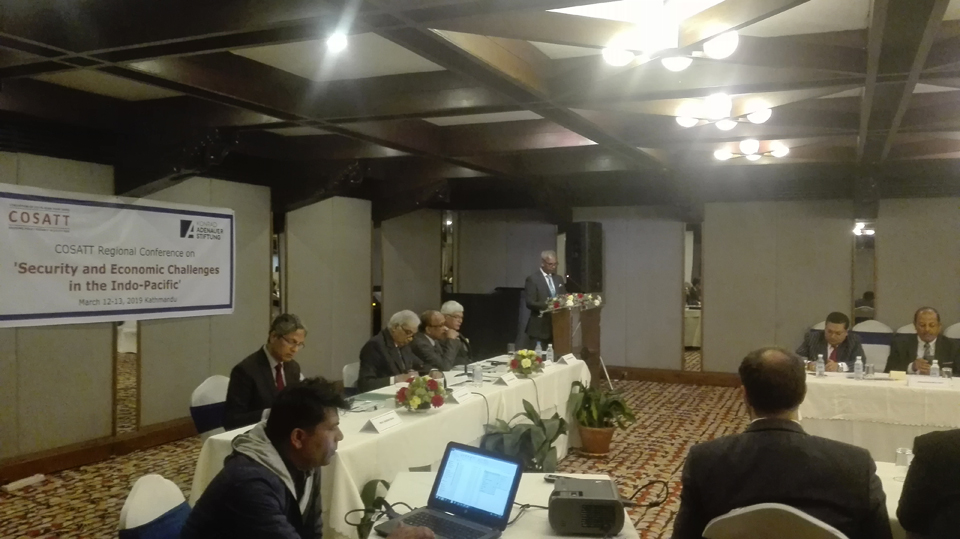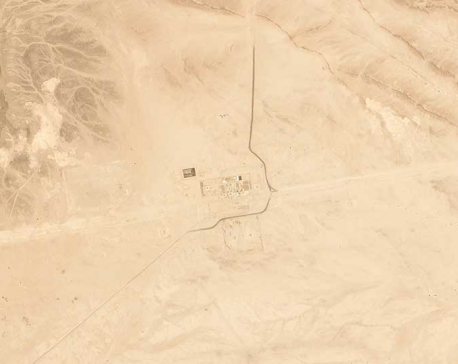
OR
Indo-Pacific strategy could threaten regional security: Experts
Published On: March 13, 2019 06:00 AM NPT By: Republica | @RepublicaNepal

KATHMANDU, March 13: Security and foreign policy experts from various countries in various South Asian countries said the newly-unveiled Indo-Pacific strategy by the US could pose threats to smaller states if this is pursued as security architecture.
Speaking at a two-day "COSATT Regional Conference on Security and Economic Challenges in the Indo-Pacific" in Kathmandu, the experts also argued that smaller states in South Asia should seek to 'desecuritize' Indo-Pacific strategy — that is often seen as countermove of the US to respond to China's Belt and Road Initiative— and look for economic opportunities through constructive engagements. The experts also maintained that South Asian countries should cautiously handle their ties with the United States and China in the changed geopolitical reality.
Major General AKM Abdur Rahman, the director general at the Bangladesh Institute of International and Strategic Studies, said that the geopolitical rivalry between the United States and China may destabilize peace and stability in smaller countries like Bangladesh and Nepal.
"With the resurgence of China, the United States has been focusing its strategy in the Asia region. However, it failed to deliver on its promises to Asia during the Obama administration and now it is coming with the Indo-Pacific concept while renaming the erstwhile Asia Pacific concept," he said in the program jointly organized by Konrad Adenauer Stiftung and Center for South Asian Studies.
General Rahman stressed on the need to ensure cooperation among the South Asian countries to overcome these security and economic challenges brought about by the Indo-Pacific concept launched by the United States and China's Belt and Road Initiative.
Nepal's Former Permanent Representative to United Nations in Geneva, Shambhu Ram Simkhada said that it will be very crucial question for the South Asian countries to strike balance between the Indo-Pacific concept and the Belt and Road Initiative."We have left the SAARC in the lurch and started now talking about the BIMSTEC and other initiatives in this region. So, it will be very interesting to see how India will take the lead of South Asia in coming days" he said.
Professor Gamini Keerawella, who is associated with at the Regional Center for Strategic Studies in Sri Lanka, said that India is in the heart of the US-led Indo-Pacific strategy. "India is also getting involved in the Indo-Pacific concept as it serves security and maritime interests of India," he said. Stating that China has emerged as a new power in South Asia, Keerawella argued that smaller countries in South Asia need to balance various forces including China, US and India.
Arguing that the Indo-Pacific strategy of the US signals shift of power from Europe and America to the Indo-Asia, Prof. Suba Chandran, who is Dean of National Institute of Advanced Studies in Bangalore, said the strategic rivalry between US and China in South Asia could pose security threats to countries in South Asia. He argued that only way forward is to pursue this as a means to achieve economic opportunities rather than security architecture.
Professor Swaran Singh at the Jawaharlal Nehru University in India said the US is under pressure to redouble its efforts to expand its influence in South Asia after the rise of China. He maintained that the South Asian countries have been striking balanced relationship between China and the United States in recent years.
You May Like This

Amazon confirms two employees in Italy have contracted coronavirus
WASHINGTON, March 2: Amazon.com Inc said late on Sunday that two employees in Milan, Italy, have contracted the coronavirus and... Read More...

African malaria threat
Malaria imported from African continent has been increasing steadily in the last few years, and is posing unnoticed public health... Read More...

Iran’s supreme leader makes uranium enrichment threat
DUBAI, May 15: Iran’s supreme leader issued a veiled threat in the same speech in which he stated that “no... Read More...






Just In
- NRB introduces cautiously flexible measures to address ongoing slowdown in various economic sectors
- Forced Covid-19 cremations: is it too late for redemption?
- NRB to provide collateral-free loans to foreign employment seekers
- NEB to publish Grade 12 results next week
- Body handover begins; Relatives remain dissatisfied with insurance, compensation amount
- NC defers its plan to join Koshi govt
- NRB to review microfinance loan interest rate
- 134 dead in floods and landslides since onset of monsoon this year











Leave A Comment